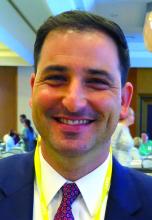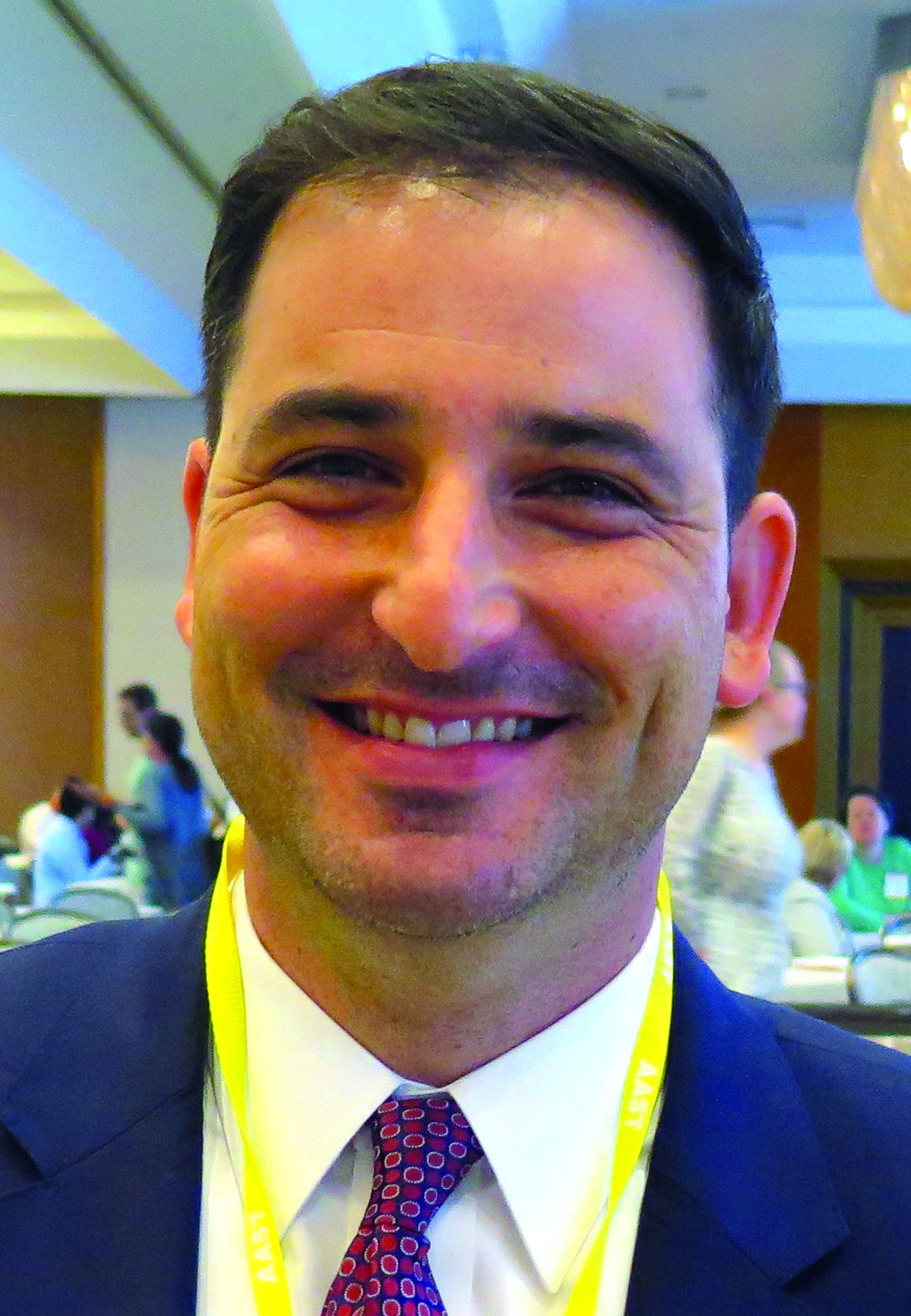User login
WAIKOLOA, HAWAII – Trauma training for general surgery residents has significantly declined in recent years, results from an analysis of the Accreditation Council for Graduate Medical Education data registry on surgical education showed.
Aaron Strumwasser, MD, an attending trauma surgeon and surgical intensivist at the Los Angeles County/University of Southern California Medical Center, characterized the decline in trauma training as “sobering.” In an effort to test their hypothesis that trauma training for general surgery residents is on the decline since the inception of the 80-hour workweek, Dr. Strumwasser and his associates set out to compare the operative caseloads before and after the inception of the 80-hour workweek; to note trends in specific operative domains and determine if deficiencies exist and to determine whether subspecialty training (specifically, vascular fellowship and integrated vascular surgery residency) has altered general surgery resident operative volume. They extracted data from the ACGME database on resident trauma volume for trauma cases by category and by resident training year for the years 1999-2015. Only those cases logged as primary surgery were included. The researchers subdivided trauma cases into five domains: head and neck, thoracic, abdomen, solid organ, and extremity. Resident trauma experience (operative caseload) was compared, based on before the inception of the 80-hour workweek (1999-2002) and after (2003-present).
Solutions to the current situation seem to fall into one of three categories, Dr. Strumwasser said: advanced simulation training such as Advanced Surgical Skills Exposure in Trauma and Advanced Trauma Operative Management; extending or changing the structure of general surgery training and promoting trauma and Acute Care Surgery fellowships.
“Subspecialization has clearly narrowed the scope of general surgery and trauma surgery practice. As a result, we now treat many complex injuries with a team-based approach. So unless societal trends reverse, it is highly unlikely that we will do more open operations in the future, since many nonoperative and noninvasive options work just as well or even better, said Dr. Malangoni. “It’s easy to blame these changes on duty hours requirements and the corresponding reduction in call, and decreasing exposure to trauma and emergent conditions. However, it’s important to recognize that there are 10% more residencies as well as 15% more resident graduates in 2015, compared to 15 years ago, which further magnifies the effect of the overall decline in trauma operative volume. So how do we meet the challenge of teaching residents to perform operations uncommonly done not only during but also after residency, while maintaining quality care for our patients? This is a challenge shared by nearly every surgical specialty due to a general decline in open operations overall.”
Dr. Strumwasser reported having no financial disclosures.
WAIKOLOA, HAWAII – Trauma training for general surgery residents has significantly declined in recent years, results from an analysis of the Accreditation Council for Graduate Medical Education data registry on surgical education showed.
Aaron Strumwasser, MD, an attending trauma surgeon and surgical intensivist at the Los Angeles County/University of Southern California Medical Center, characterized the decline in trauma training as “sobering.” In an effort to test their hypothesis that trauma training for general surgery residents is on the decline since the inception of the 80-hour workweek, Dr. Strumwasser and his associates set out to compare the operative caseloads before and after the inception of the 80-hour workweek; to note trends in specific operative domains and determine if deficiencies exist and to determine whether subspecialty training (specifically, vascular fellowship and integrated vascular surgery residency) has altered general surgery resident operative volume. They extracted data from the ACGME database on resident trauma volume for trauma cases by category and by resident training year for the years 1999-2015. Only those cases logged as primary surgery were included. The researchers subdivided trauma cases into five domains: head and neck, thoracic, abdomen, solid organ, and extremity. Resident trauma experience (operative caseload) was compared, based on before the inception of the 80-hour workweek (1999-2002) and after (2003-present).
Solutions to the current situation seem to fall into one of three categories, Dr. Strumwasser said: advanced simulation training such as Advanced Surgical Skills Exposure in Trauma and Advanced Trauma Operative Management; extending or changing the structure of general surgery training and promoting trauma and Acute Care Surgery fellowships.
“Subspecialization has clearly narrowed the scope of general surgery and trauma surgery practice. As a result, we now treat many complex injuries with a team-based approach. So unless societal trends reverse, it is highly unlikely that we will do more open operations in the future, since many nonoperative and noninvasive options work just as well or even better, said Dr. Malangoni. “It’s easy to blame these changes on duty hours requirements and the corresponding reduction in call, and decreasing exposure to trauma and emergent conditions. However, it’s important to recognize that there are 10% more residencies as well as 15% more resident graduates in 2015, compared to 15 years ago, which further magnifies the effect of the overall decline in trauma operative volume. So how do we meet the challenge of teaching residents to perform operations uncommonly done not only during but also after residency, while maintaining quality care for our patients? This is a challenge shared by nearly every surgical specialty due to a general decline in open operations overall.”
Dr. Strumwasser reported having no financial disclosures.
WAIKOLOA, HAWAII – Trauma training for general surgery residents has significantly declined in recent years, results from an analysis of the Accreditation Council for Graduate Medical Education data registry on surgical education showed.
Aaron Strumwasser, MD, an attending trauma surgeon and surgical intensivist at the Los Angeles County/University of Southern California Medical Center, characterized the decline in trauma training as “sobering.” In an effort to test their hypothesis that trauma training for general surgery residents is on the decline since the inception of the 80-hour workweek, Dr. Strumwasser and his associates set out to compare the operative caseloads before and after the inception of the 80-hour workweek; to note trends in specific operative domains and determine if deficiencies exist and to determine whether subspecialty training (specifically, vascular fellowship and integrated vascular surgery residency) has altered general surgery resident operative volume. They extracted data from the ACGME database on resident trauma volume for trauma cases by category and by resident training year for the years 1999-2015. Only those cases logged as primary surgery were included. The researchers subdivided trauma cases into five domains: head and neck, thoracic, abdomen, solid organ, and extremity. Resident trauma experience (operative caseload) was compared, based on before the inception of the 80-hour workweek (1999-2002) and after (2003-present).
Solutions to the current situation seem to fall into one of three categories, Dr. Strumwasser said: advanced simulation training such as Advanced Surgical Skills Exposure in Trauma and Advanced Trauma Operative Management; extending or changing the structure of general surgery training and promoting trauma and Acute Care Surgery fellowships.
“Subspecialization has clearly narrowed the scope of general surgery and trauma surgery practice. As a result, we now treat many complex injuries with a team-based approach. So unless societal trends reverse, it is highly unlikely that we will do more open operations in the future, since many nonoperative and noninvasive options work just as well or even better, said Dr. Malangoni. “It’s easy to blame these changes on duty hours requirements and the corresponding reduction in call, and decreasing exposure to trauma and emergent conditions. However, it’s important to recognize that there are 10% more residencies as well as 15% more resident graduates in 2015, compared to 15 years ago, which further magnifies the effect of the overall decline in trauma operative volume. So how do we meet the challenge of teaching residents to perform operations uncommonly done not only during but also after residency, while maintaining quality care for our patients? This is a challenge shared by nearly every surgical specialty due to a general decline in open operations overall.”
Dr. Strumwasser reported having no financial disclosures.
Key clinical point:
Major finding: A trend toward decreased operative trauma for general surgery residents was observed in the time periods before and after implementation of the 80-hour workweek (a mean of 39,252 vs. 36,065 cases, respectively; P = .07).
Data source: An analysis of data from the ACGME database on resident trauma volume for trauma cases by category and by resident training year for the years 1999-2015.
Disclosures: Dr. Strumwasser reported having no financial disclosures.


